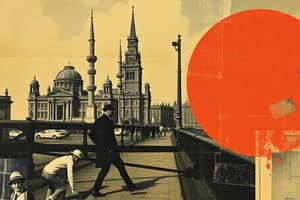Podcast
Questions and Answers
What do economists mean by scarcity?
What do economists mean by scarcity?
They mean that unlimited wants exceed limited resources.
Are food, time, gas, and workers considered scarce by economists?
Are food, time, gas, and workers considered scarce by economists?
False (B)
What is the Production Possibilities Frontier?
What is the Production Possibilities Frontier?
It shows the maximum attainable combinations of two goods that may be produced with available resources.
How is economic efficiency shown?
How is economic efficiency shown?
How is economic inefficiency shown?
How is economic inefficiency shown?
What will cause the Production Possibilities Frontier to shift outward?
What will cause the Production Possibilities Frontier to shift outward?
What is meant by Comparative Advantage?
What is meant by Comparative Advantage?
What does the circular flow diagram illustrate?
What does the circular flow diagram illustrate?
What are the two main categories of participants in markets?
What are the two main categories of participants in markets?
Which participants in markets are of greatest importance in determining what goods and services are produced?
Which participants in markets are of greatest importance in determining what goods and services are produced?
What does Capital refer to?
What does Capital refer to?
In a circular flow diagram showing how a market system works, what flows to firms?
In a circular flow diagram showing how a market system works, what flows to firms?
What do economists call the inputs used to make goods and services?
What do economists call the inputs used to make goods and services?
Why is scarcity central to economics?
Why is scarcity central to economics?
What is meant by the statement about economics assuming rationality?
What is meant by the statement about economics assuming rationality?
When economists develop models designed to explain choices, what do they generally assume?
When economists develop models designed to explain choices, what do they generally assume?
What does economists mean by the word 'Marginal'?
What does economists mean by the word 'Marginal'?
An optimal decision occurs when marginal benefits equal what?
An optimal decision occurs when marginal benefits equal what?
What do economists believe about continuing an activity?
What do economists believe about continuing an activity?
What are the three economic questions every society must answer?
What are the three economic questions every society must answer?
Centrally planned economies allocate resources based on what?
Centrally planned economies allocate resources based on what?
Market economies answer three economic questions through what?
Market economies answer three economic questions through what?
What does productive efficiency mean?
What does productive efficiency mean?
What does allocative efficiency mean?
What does allocative efficiency mean?
What does efficiency mean in economic terms?
What does efficiency mean in economic terms?
What does equity mean?
What does equity mean?
Why do centrally planned economies seem to be less efficient?
Why do centrally planned economies seem to be less efficient?
Relative to a market economy, a centrally planned economy would be expected to be better at what?
Relative to a market economy, a centrally planned economy would be expected to be better at what?
What is opportunity cost?
What is opportunity cost?
Trade-offs force society to make choices particularly when answering what?
Trade-offs force society to make choices particularly when answering what?
In a market system, what determines how goods and services will be produced?
In a market system, what determines how goods and services will be produced?
Flashcards are hidden until you start studying
Study Notes
Scarcity
- Scarcity occurs when unlimited wants exceed limited resources, central to the study of economics.
- Food, time, gas, and workers are not considered scarce resources by economists.
Production Possibilities Frontier (PPF)
- The PPF illustrates the maximum attainable combinations of two goods that can be produced with available resources.
- Economic efficiency is represented by points on the PPF, while inefficiency is shown by points inside the frontier.
- Technological advances can cause the PPF to shift outward, indicating increased production capacity.
Comparative Advantage
- Comparative advantage refers to the ability of an individual, firm, or country to produce a good or service at a lower opportunity cost than competitors.
Circular Flow Diagram
- The circular flow diagram represents how households and firms interact through product and factor markets.
- Participants in markets are categorized as firms and households, with households playing a crucial role in determining production of goods and services.
Capital and Factors of Production
- Capital consists of goods used to produce other goods.
- Inputs used to create goods and services are termed factors of production.
Opportunity Cost
- Scarcity implies that every choice comes with an opportunity cost, representing the highest valued alternative forgone.
Rational Decision-Making
- Economic models assume individuals act rationally, aiming to maximize benefits while minimizing costs.
- Optimal decisions occur when marginal benefits equal marginal costs.
Economic Questions
- Societies must address three fundamental economic questions:
- What goods will be produced?
- How will these goods be produced?
- For whom will these goods be produced?
Economic Systems
- Centrally planned economies allocate resources through governmental decisions, often lacking incentives for hard work and innovation, leading to inefficiencies.
- Market economies answer essential economic questions through the decisions of households and firms, promoting competition and efficiency.
Efficiency and Equity
- Productive efficiency is achieved when goods/services are produced at the lowest possible cost.
- Allocative efficiency occurs when the production of goods/services meets the point where marginal cost equals marginal benefit.
- Overall efficiency maximizes societal benefits, whereas equity ensures fairness in the distribution of goods.
Trade-offs and Choices
- Trade-offs compel societies to make choices when addressing the three key economic questions.
- In a market system, firms decide how goods and services will be produced, influencing resource allocation and efficiency in production.
Studying That Suits You
Use AI to generate personalized quizzes and flashcards to suit your learning preferences.




